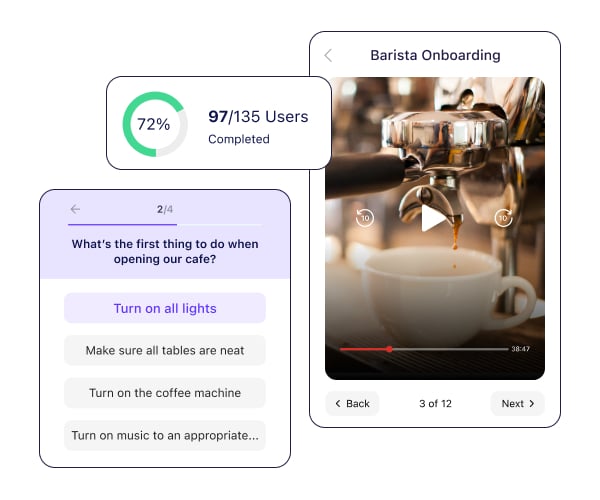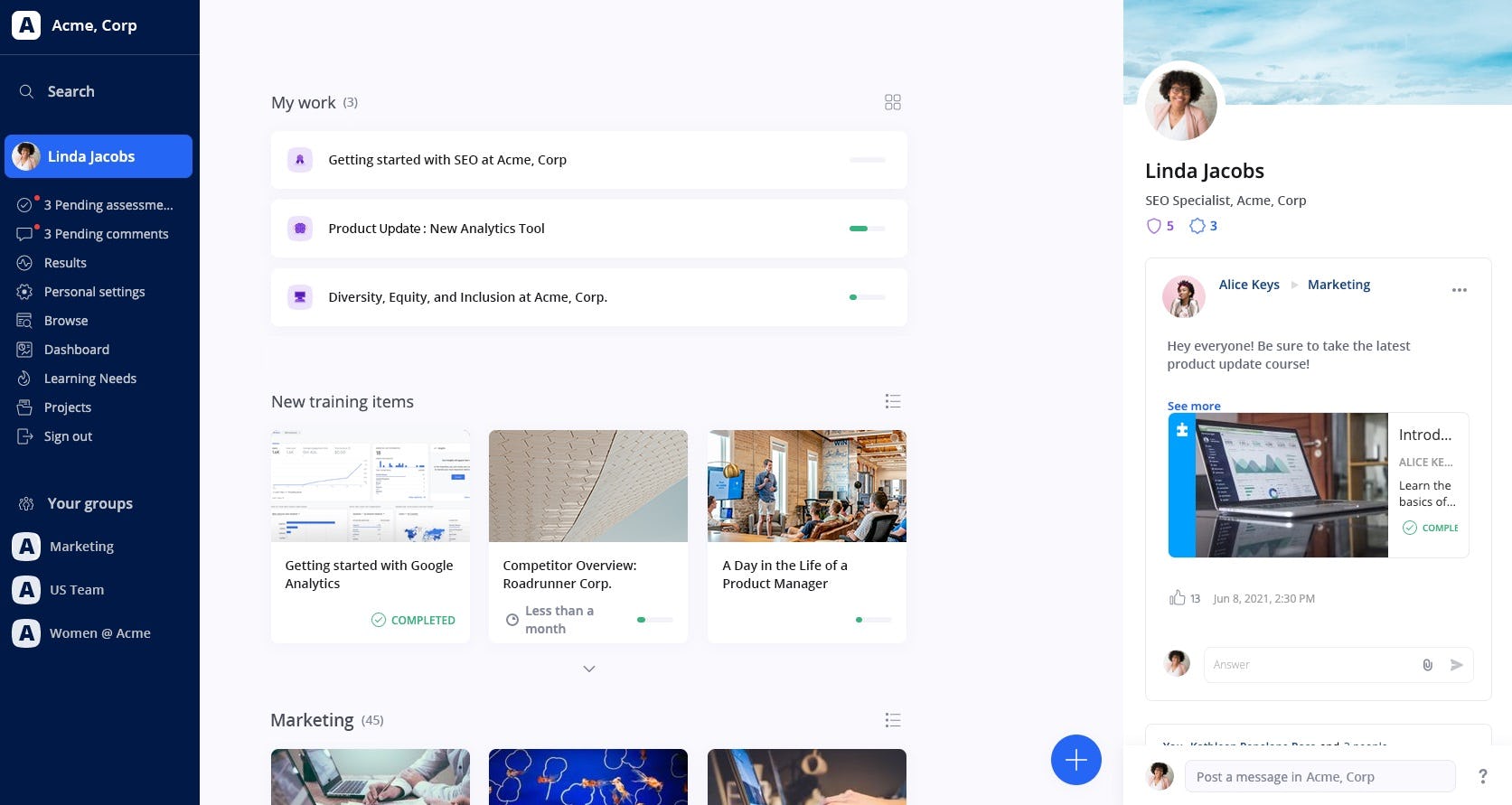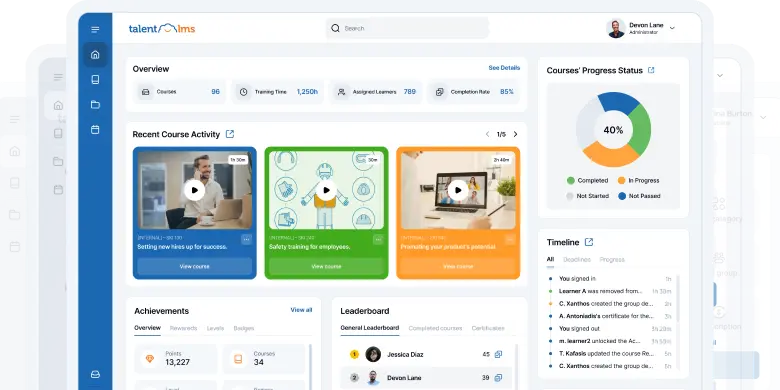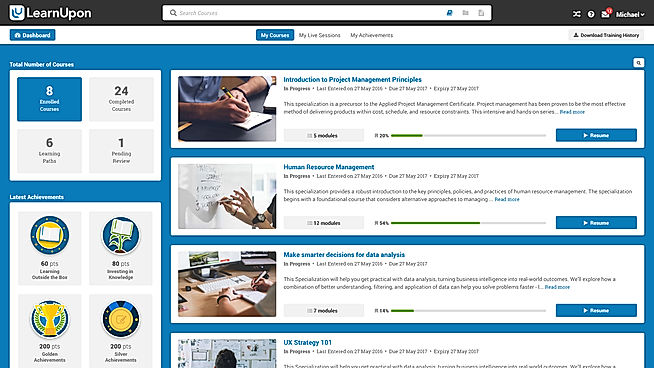Choosing the best learning platform for your smaller business can feel overwhelming. You need a system that's ready-to-use for onboarding, compliance, and role-specific training-without breaking the bank.
Here’s a concise guide to the top 10 platforms ideal for companies under 200 employees.
1. Learn Amp
.png?width=626&height=366&name=spark%20(2).png)
Learn Amp is ideal for smaller businesses looking to simplify and streamline their training programmes. It effortlessly balances structured training - like compliance and onboarding - with flexible, personalised learning for individual career growth. Its key strengths for businesses with fewer than 200 employees include ready-made templates for processes, policies, software training, and role-specific onboarding.
With pre-bundled content libraries covering critical areas such as compliance, soft skills, and commonly used software tools, businesses can get started quickly, saving time on course creation. Managers benefit from straightforward administrative controls, easily assigning and tracking learning without being overwhelmed by complexity. Furthermore, Learn Amp excels in delivering hybrid training solutions, perfectly accommodating teams split between in-person and remote work environments.
While Learn Amp isn’t the cheapest solution available, its customers frequently highlight the platform’s exceptional customer service, intuitive design, and the depth of its functionality - earning it outstanding ratings across review platforms. If you value a solution that grows seamlessly alongside your business, Learn Amp’s comprehensive yet intuitive approach makes it the standout choice.
Pros:
-
Pre-built content libraries for compliance, software, and soft skills
-
Easy-to-use onboarding and training templates
-
Exceptional customer support (4.9/5 reviews)
-
Smooth integration into existing systems (70+ integrations available)
Con:
-
Premium platform - not the cheapest available
2. Connecteam

Connecteam focuses on frontline and mobile-first learning, ideal for smaller, deskless teams. Its strongest asset is delivering targeted onboarding and compliance content through mobile-friendly templates and workflows. Users appreciate the simplicity and speed of deployment, ideal for teams on-the-go. However, while the mobile experience is excellent, the desktop and admin interfaces can be somewhat restrictive and basic, limiting comprehensive tracking and management for those wanting deeper reporting. A budget-friendly pick for small, mobile teams, especially where rapid communication is crucial.
Pros: Excellent mobile learning, cost-effective
Con: Limited desktop/admin functionality
3. iSpring Learn

iSpring Learn shines in rapid course creation and software training, offering robust authoring tools and easy-to-use templates. SMEs can quickly build professional-grade content with minimal effort, including engaging quizzes and compliance checks. It’s highly affordable, appealing to businesses mindful of cost. The main downside is its simplicity—lacking sophisticated engagement or skills-development features, which means advanced tracking or career mapping might require additional tools or manual processes. A great entry-level platform, especially suited to businesses focused on practical skills training.
Pros: Rapid deployment, powerful authoring tools
Con: Limited employee engagement features
4. 360Learning

360Learning emphasises collaborative and peer-driven learning, ideal for businesses keen on nurturing knowledge-sharing cultures. Its strength lies in enabling employees to quickly author and share content, particularly helpful for onboarding new hires and creating standardised processes. The system encourages team involvement, fostering a learning-first culture internally. However, traditional LMS tracking and compliance monitoring features aren’t as advanced as others, which may challenge SMEs needing deeper analytics or audit-ready reports. Excellent for internal knowledge sharing but limited for strict compliance-driven training needs.
Pros: Strong collaborative features, intuitive
Con: Limited LMS-style tracking
5. Absorb LMS

Absorb LMS is robust, providing comprehensive training management suited for SMEs poised for growth. Its extensive library of templates and AI-driven learning paths streamline employee development, compliance, and onboarding tasks. Reporting capabilities are thorough, aiding effective training management. However, smaller teams might find Absorb overly complex or feature-heavy, with many functionalities potentially underutilised, making it feel less intuitive for those new to learning systems. Great if you’re scaling rapidly, but potentially overwhelming for smaller organisations needing simplicity and ease of use.
Pros: Comprehensive feature set, good scalability
Con: Overly complex for very small teams
6. TalentLMS

TalentLMS simplifies the learning process with an easy-to-use interface ideal for SMEs. It supports both self-paced and instructor-led learning, catering to diverse training preferences. Affordable pricing, quick setup, and straightforward course management make it attractive to budget-conscious businesses. However, the trade-off is that it can feel simplistic for those looking for deeper reporting or more sophisticated employee engagement tools. Great as a first step into LMS technology but limited if your business needs more advanced training management or skills tracking capabilities.
Pros: Budget-friendly, easy setup
Con: Limited advanced functionality
7. SAP Litmos

Litmos excels in mobile-first training and multilingual support, providing simple yet effective training solutions for small teams with global reach. Its strengths lie in compliance, safety training, and basic onboarding, supported by straightforward course creation. Cost-effective for small businesses, it delivers solid value. However, Litmos’s learner experience and reporting capabilities have limitations, potentially causing frustrations when deeper analytics or user customisation is required. Suitable for SMEs needing quick-start compliance training but less effective for continuous, detailed skills development.
Pros: Good mobile experience, multilingual support
Con: Basic reporting and learner engagement features
8. LearnUpon

LearnUpon provides SMEs a straightforward LMS solution emphasising ease of use, reliability, and solid compliance support. It's excellent for onboarding new hires efficiently, with ready-made content for essential training. Businesses appreciate its simplicity and streamlined workflows. Nonetheless, LearnUpon lacks sophisticated tools for deeper employee engagement or skills mapping, meaning long-term personal development might require additional investment elsewhere. Ideal for businesses prioritising compliance and simplicity but less compelling if comprehensive skill development is a top priority.
Pros: Simple and intuitive, solid compliance focus
Con: Limited skills development features
9. EdApp

EdApp leverages microlearning, providing SMEs an engaging, mobile-focused training solution. Ideal for delivering bite-sized, easily digestible content, it excels in onboarding, compliance refreshers, and product knowledge training. Cost-effective and quick to set up, it suits businesses seeking rapid deployment. However, EdApp struggles with deeper LMS needs, like detailed reporting, role-based learning paths, and complex compliance tracking. Best suited to SMEs prioritising quick, frequent learning interventions rather than extensive, structured employee development programs.
Pros: Microlearning-focused, very engaging
Con: Lacks detailed LMS reporting
10. Lessonly by Seismic
Lessonly offers SMEs straightforward employee training with strengths in customer-facing teams and sales training. Its intuitive platform makes it easy to quickly create and share training content internally, notably for new hires and customer interaction training. Simple and user-friendly, Lessonly suits teams without dedicated L&D staff. However, advanced compliance tracking, robust skills mapping, and comprehensive reporting tools are weaker points, limiting effectiveness in highly regulated industries. Ideal for SMEs with clear, focused training needs but less suited for complex compliance scenarios.
Pros: Easy content creation, great for customer-facing roles
Con: Limited compliance management features



